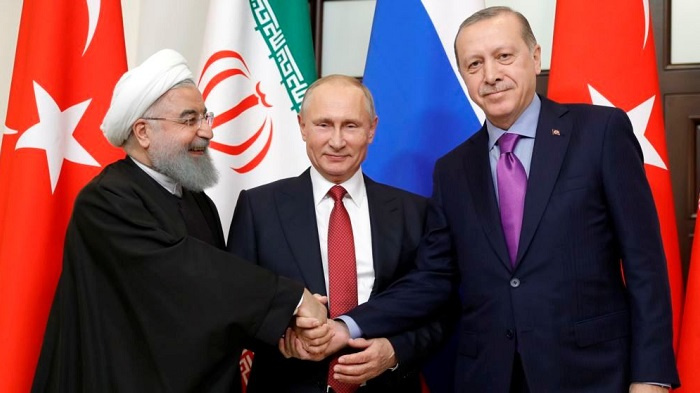Rise of New Game Changers in the Middle East

While the crisis in Syria is entering its eighth year, some regional parties are apparently not interested to see an end to the long crisis in the country and are unwilling to allow establishment of peace in the war-torn nation.
It is a source of wonder why some Arab and Western parties do not want the crisis in Syria to come to an end.
The crisis in Syria started with financial and military support of some Arab countries in the region, including Saudi Arabia, Qatar and some other countries, and terrorists managed to take control of some border cities in Syria soon and gradually advanced further to dominate large swathes of the Syrian territory.
Expectations were high among terrorists in Syria to take control of Damascus, the Syrian capital, overthrow the government and celebrate a total victory.
But they were wrong; the strategic position of Syria on one hand, and the urgency of stopping the threats from the Takfiri terrorists who were trying to turn the country into a terrorist safe haven, made regional countries like Iran and Russia to step in and help Syria ward off further spread of terrorism.
The presence of Iran and Russia, made based on a formal request by the legitimate government in Syria, changed the fate of the country by paving the path toward a final annihilation of terrorists in Syria.
With the last remnants of terrorists were recently defeated by the Syrian army in Douma, a town about 10 km northeast of the center of the Syrian capital, promoters of terrorism in the country are presently witnessing imminent demise of their proxy pets. So, not surprisingly, they are using all the leverages at their disposal to restore their morale and fuel flames of war.
The recent US-led missile attack on Syria is good evidence to the attempts by Western powers and supporters of terrorism to aggravate the crisis in the country.
But the military operation, jointly conducted by the United States, Britain and France, was just an act showing the climax of frustration of the Western powers and their regional allies.
The Syrian army and people now have the upper and the country is increasingly moving toward establishing a prevailing peace.
One of the main achievements Syria made surviving the ordeal is that for years to come the country will be immune from a new crisis.
Now Syria, like Iraq, is regarded as a nation with invaluable experience in the fight against terrorism. More, the strategic alliance between Damascus and Tehran is a source of concern for the enemies like the Zionist regime of Israel. That is why Tel Aviv today is trying not to allow at any price establishment of peace and tranquility in Syria, using all options to prop up terrorists in Syria by providing them with all kinds of support.
In addition, stabilization of the Syrian government' authority will enable the country to address better its political, social and economic issues and devise a roadmap for future development of the country. Syria is expected to rise up as a powerful Arab nation among the countries in the region.
In fact, with the crisis in Syria coming to an end, Syria is expected to appear as one of the main supporters of the Resistance Front in the region and by relying on its experience gained from years of relentless fight against terrorists, the country is expected to play a more vital role in regional developments, in particular in dealing with the issue of Palestinians in the Occupied Territories and the Zionist occupiers.
This, in turn, will solidify Iran's position as a key regional player and Syria's reliable partner and the two allies will appear as regional game changers repercussions of which will be felt well in other parts of the region, including Lebanon and Yemen.
The Lebanese Hezbollah Movement that clearly played a vital role as well in defeating terrorists in Syria, is now regarded as a force capable of changing balances and the Movement is seen as a force that will protect Lebanon against future threats and harms.
Washington cannot accept new realities of the region and American officials wonder why in the picture showing Iranian, Russian and Turkish heads of state in a recent meeting in AnKara no US officials are present.
The United States should come to realize that the rules of the game have changed and new players have appeared on the global scene.
Article By: Davood Poorsehat
Translator: Reza Bahar
Source: IRNA

